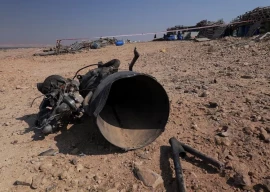
ISLAMABAD: In a positive sign of burying the hatchet, Afghanistan President Ashraf Ghani Ahmadzai and Pakistani Prime Minister Nawaz Sharif have agreed to “counter common threats, work for regional cooperation and boost bilateral relations.”
According to the Afghan presidential palace, in a telephonic conversation between the two leaders on Eid, PM Sharif called for “a strong relationship with Afghanistan.”

The conversation between Ghani and Sharif has raised hopes for improved ties between the two countries as years of political tension and mistrust have caused a serious setback to cooperation in peace and security issues.
In a previous message, Sharif formally invited Ghani to visit Pakistan to “enable us to chart a new course in our relations and proceed together on a journey of peace, progress and shared prosperity.”
Moreover, keeping in view the continued tensions between the two countries, Pakistan took a wise decision to send its highest level representation at Ghani’s inauguration ceremony.
Pakistani President Mamnoon Hussain was the only head of the state to arrive in Kabul to witness the first ever democratic transition in Afghanistan’s history.
“As the two nations’ destiny is connected to each other, I hope the trust between the two countries can further be strengthened,” the presidential palace quoted Ghani as saying in a meeting with his Pakistani counterpart.
President Hussain’s visit has helped in decreasing tensions which mostly persist over border issues and the blame game over the presence of Taliban militants in both countries. Since September 29, the day Ghani was sworn in, no hostile statement about Pakistan has been issued and this can be viewed as a major confidence-building measure.
Looking at the bright side
Afghan and Pakistani diplomats as well as foreign affairs experts are optimistic about a robust relationship during the tenure of the new Afghan leadership. Playing down the recent tensions, diplomats and experts underscore the need for a new beginning to achieve peace.
Afghan ambassador in Islamabad Janan Mosazai said he is confident about the improvement in bilateral relations. “The new Afghan government has a strong desire to open a new chapter of relations and cooperation with Pakistan,” Ambassador Janan Mosazai told The Express Tribune.
“President Ghani has a vision for special relations between Pakistan and Afghanistan. We will succeed in putting an end to mistrust,” he added.
Similarly, Pakistani experts on Afghan affairs are also optimistic about a cordial bilateral relationship during Ghani’s government.
Ayaz Wazir, who has served as Pakistani Consul General in Mazar-i-Sharif in the 90s, said, “I am hopeful that the new Afghan government will lay the foundation for a new beginning and Pakistan will respond positively.”
“Contentious issues like the Durand Line should not be raised. The line is there and the fact is that it is a permanent border, however, Afghanistan has reservations over it. This would not be a good time to raise those issues,” said Wazir.
“I think the best beginning would be to bury the past. Whatever happened in the past should be ignored, the beginning should be on a positive note,” the former diplomat added.
Although President Ghani is yet to formally announce his internal and foreign policies, he has taken some important internal decisions and plans to travel to China later this month to attend the ministerial conference, Heart of Asia -Istanbul Process. This would be a good opportunity for him to interact with Chinese as well as other world leaders.
The conference was established late in 2011 to provide a platform to discuss regional issues, particularly encouraging security, political and economic cooperation among Afghanistan and its neighbours.
Published in The Express Tribune, October 11th, 2014.
















































COMMENTS
Comments are moderated and generally will be posted if they are on-topic and not abusive.
For more information, please see our Comments FAQ